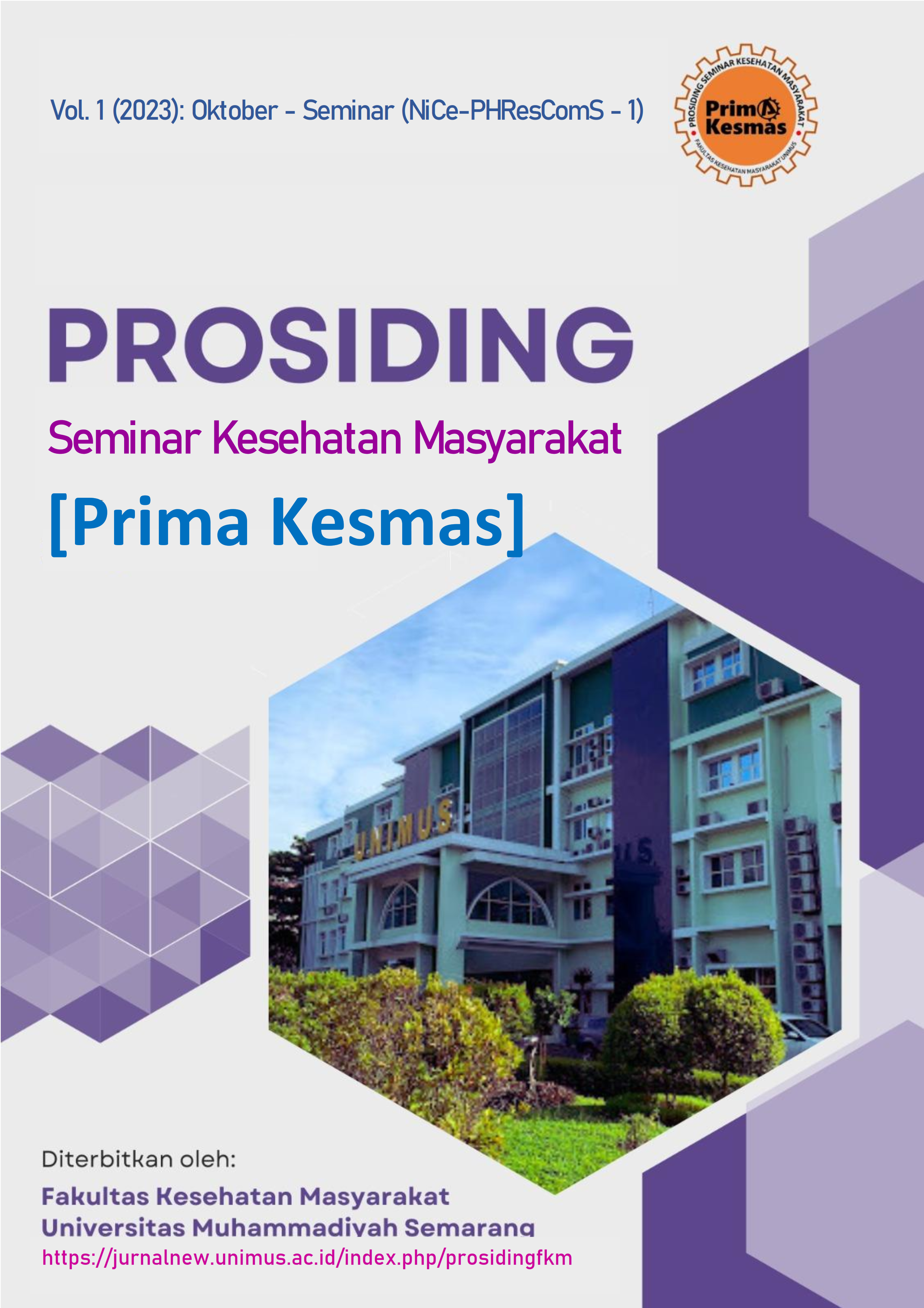Penularan Penyakit Malaria Oleh Vektor Zoofilik Dengan Sumber Pakan Darah Non Manusia
DOI:
https://doi.org/10.26714/pskm.v1iOktober.237Keywords:
malaria, h-Plasmodium, ternak piaraan, ruminansia, reservoirAbstract
Latar belakang: Keberadaan parasit human Plasmodium (h-Plasmodium) pada berbagai hewan perlu dijadikan pemikiran lanjut terkait penularan penyakit malaria. Keberadaannya akan menjadi penentu peran hewan, apakah menjadi reservoir atukah tidak. Keraguan atas kemampuan hidup h-Plasmodium pada hewan ternak menjadi sebuah wahana pembuktian secara ilmiah. Metode: Penelitian berbasis traditional review dilakukan dengan menelusur sumber referensi melalui Google Scholar.enam artikel ditemukan melaporkan keberadaan h-Plasmodium dan petandanya pada beberapa jenis ternak domestik di Indonesia. Hasil: Ke-enam artikel yang dikaji sangat meyakinkan bahwa h-Plasmodium dapat bertahan hidup pada ternak domestik seperti kerbau, kambing, sapi, kuda dan anjing. Stadium gametosit dilaporkan oleh salah satu artikel yang mengandung penjelasan bahwa h-Plasmodium dapat hidup dengan baik hingga tahap paling akhir fase eritrositik. Kesimpulan: ternak domestik seperti kambing, kerbau, sapi, kuda dan anjing dapat menjadi reservoir non manusia dalam penularan penyakit malaria.
References
Harijanto P, Laihad F, Poesporodjo J. Epidemiologi Malaria di Indonesia. Buletin Jendela Data dan Informasi Kesehatan, Kementerian Kesehatan RI, 2011, https://pusdatin.kemkes.go.id/download.php?file=download/pusdatin/buletin/buletin-malaria.pdf (2011).
Shinta S, Sukowati S, Pradana A, et al. Beberapa Aspek Perilaku Anopheles maculatus Theobald di Pituruh, Kabupaten Purworejo, Jawa Tengah. Bul Penelit Kesehat 2013; 41: 131–141.
Kirnowardoyo S. Status of Anopheles malaria vectors in Indonesia. Southeast Asian J Trop Med Public Health 1985; 16: 129–132.
Yakubu A., Singh A. Livestock : An alternative mosquito control measure. Sokoto J Vet Sci; 7, https://www.ajol.info/index.php/sokjvs/article/download/72719/61635 (2008).
Susanna D, Eryando T. Faktor Dominan yang Mempengaruhi Kejadian Malaria di Perdesaan. Kesehat Masy Nas 2010; 4: 180–185.
Hurd H. Can cows protect against mosquito bites ? Biomed Central Blogs, http://blogs.biomedcentral.com/bugbitten/2014/03/27/can-cows-protect-against-mosquito-bites-2/ (2014).
Munirah M, Wahyuni S, Wahid I, et al. The discovery of human Plasmodium among domestic animals in West Sumba and Fakfak , Indonesia. F1000Research 2021; 10: 1–11.
Opara M, Nwokedi C. Occurrence of Haemoparasites among Small Ruminants Reared under Traditional Husbandry System in Owerri, Southeast Nigeria. Bull Anim Heal Prod Africa 2011; 59: 393–398.
Aseme T, Robert B, Amuzie C, et al. Haematological Parameters and Haemoparasites of West African Dwarf Goats Sold at Trans-Amadi and Rumuokoro Abattoirs, Port Harcourt, Nigeria. Curr Trends Vet Dairy Res 2020; 1: 14–20.
Kaewthamasorn M, Takeda M, Saiwichai T, et al. Genetic homogeneity of goat malaria parasites in Asia and Africa suggests their expansion with domestic goat host. Sci Rep 2018; 8: 1–7.
Albadrani BA, Alabadi BH. A preliminary Study of Malaria infection (Plasmodium spp.) in Iraqi Livestock. Egypt J Vet Sci 2021; 51: 43–54.
Sumanto D, Hadisaputro S, Adi MS, et al. Parasit Plasmodium sp pada Ternak Kambing Etawa di Daerah Endemik Malaria Kabupaten Purworejo. J Ekol Kesehat 2021; 20: 36–44.
Sumanto D, Hadisaputro S, Adi MS, et al. Human-Plasmodium Like in Domestic-goat Blood in Malaria Endemic Areas in Purworejo Indonesia. J Commun Dis 2021; 53: 3–5.
Kandel RC, Shrestha M, Sadaula A, et al. First report of malaria parasites in water buffalo in Nepal. Vet Parasitol Reg Stud Reports 2019; 18: 100348.
Nguyen AHL, Tiawsirisup S, Kaewthamasorn M. Low level of genetic diversity and high occurrence of vector-borne protozoa in water buffaloes in Thailand based on 18S ribosomal RNA and mitochondrial cytochrome b genes. Infect Genet Evol 2020; 82: 104304.
Dos Santos LC, De Oliveira Guimarães L, Grazziotin AL, et al. First molecular screening of Plasmodium species in ungulates from Southern Brazil. BMC Res Notes 2018; 11: 5–9.
Duval L, Fourment M, Nerrienet E, et al. African apes as reservoirs of Plasmodium falciparum and the origin and diversification of the Laverania subgenus. Proc Natl Acad Sci U S A 2010; 107: 10561–10566.
Krief S, Escalante AA, Pacheco MA, et al. On the diversity of malaria parasites in African apes and the origin of Plasmodium falciparum from bonobos. PLoS Pathog; 6. Epub ahead of print 2010. DOI: 10.1371/journal.ppat.1000765.
Liu W, Li Y, Learn GH, et al. Origin of the human malaria parasite Plasmodium falciparum in gorillas. Nature 2010; 467: 420–425.
Araújo MS, Messias MR, Figueiró MR, et al. Natural Plasmodium infection in monkeys in the state of Rondônia (Brazilian Western Amazon). Malar J 2013; 12: 1–8.
Dixit J, Zachariah A, P. K. S, et al. Reinvestigating the status of malaria parasite (Plasmodium sp.) in Indian non-human primates. PLoS Negl Trop Dis 2018; 12: 1–20.
Duval L, Nerrienet E, Rousset D, et al. Chimpanzee malaria parasites related to Plasmodium ovale in Africa. PLoS One 2009; 4: 3–9.
Zhang X, Kadir KA, Quintanilla-Zariñan LF, et al. Distribution and prevalence of malaria parasites among long-tailed macaques (Macaca fascicularis) in regional populations across Southeast Asia. Malar J 2016; 15: 1–8.
Lalremruata A, Magris M, Vivas-Martínez S, et al. Natural infection of Plasmodium brasilianum in humans: Man and monkey share quartan malaria parasites in the Venezuelan Amazon. EBioMedicine 2015; 2: 1186–1192.
Sumanto D, Hadisaputro S, Sakundarno Adi M, et al. Human Plasmodium in Livestock: The Absence of P fHRP2 and pLDH Among High Parasitemia Cases. Int J Med Parasitol Epidemiol Sci 2021; 2: 35–41.
Sumanto D, Sayono S, Garedaghi Y, et al. PfLDH Detected in Etawa Crossbred Goats Using Polymerase Chain Reaction Methods. Int J Med Parasitol Epidemiol Sci 2021; 2: 66–70.
Sumanto D, Chakim I, Bouway DY, et al. Plasmodium vivax Transmission to Cattle in A Malaria Endemic Area in Jayapura Regency , Indonesia. J Commun Dis 2023; 55: 83–90.
Baker J, McCarthy J, Gatton M, et al. Genetic diversity of Plasmodium falciparum Histidine-Rich Protein 2 (PfHRP2) and its effect on the performance of PfHRP2-based rapid diagnostic tests. J Infect Dis 2005; 192: 870–877.
Brown WM, Yowell CA, Hoard A, et al. Comparative structural analysis and kinetic properties of lactate dehydrogenases from the four species of human malarial parasites. Biochemistry 2004; 43: 6219–6229.
McCutchan TF, Piper RC, Makler MT. Use of malaria rapid diagnostic test to identify Plasmodium knowlesi infection. Emerg Infect Dis 2008; 14: 1750–1752.
Kyabayinze DJ, Zongo I, Cunningham J, et al. HRP2 and pLDH-based rapid diagnostic tests, expert microscopy, and PCR for detection of malaria infection during pregnancy and at delivery in areas of varied transmission: A prospective cohort study in Burkina Faso and Uganda. PLoS One 2016; 11: 1–15.
Atchade PS, Doderer-Lang C, Chabi N, et al. Is a Plasmodium lactate dehydrogenase (pLDH) enzyme-linked immunosorbent (ELISA)-based assay a valid tool for detecting risky malaria blood donations in Africa? Malar J 2013; 12: 1–10.
Maltha J, Guiraud I, Lompo P, et al. Accuracy of Pf HRP2 versus Pf -pLDH antigen detection by malaria rapid diagnostic tests in hospitalized children in a seasonal hyperendemic malaria transmission area in Burkina Faso. Malar J 2014; 13: 1–10.
Makler MT, Ries JM, Williams JA, et al. Parasite lactate dehydrogenase as an assay for Plasmodium falciparum drug sensitivity. Am J Trop Med Hyg 1993; 48: 739–741.
Oduola AMJ et al. Plasmodium falciparum, evaluation of lactate dehydrogenase in monitoring therapeutic response to standard antimalarial drugs in Nigeria. Exp Parasitol 1997; 87: 283–289.
Verma P, Biswas S, Mohan T, et al. Detection of histidine rich protein & lactate dehydrogenase of Plasmodium falciparum in malaria patients by sandwich ELISA using in-house reagents. Indian J Med Res 2013; 138: 977–987.
Salinas ND, Tolia NH. Red cell receptors as access points for malaria infection. Curr Opin Hematol 2016; 23: 215–223.
Basco LK, Marquet F, Makler MM, et al. Plasmodium falciparum and Plasmodium vivax: Lactate-Dehydrogenase Activity and Its Application for in Vitro Drug Susceptibility Assay. Exp Parasitol; 80. Epub ahead of print 1995. DOI: https://doi.org/10.1006/expr.1995.1032.
Biomed Penyelidikan Antarabangsa. Potensi Biomarker Dan Aplikasi Mereka Untuk Pengesanan Rapid Dan Boleh Dipercayai Malaria. forensicsciencetechniciandegree.com, 2022, pp. 1–15.
Tjitra E, Suprianto S, McBroom J, et al. Persistent ICT malaria P.f/P.v panmalarial and HRP2 antigen reactivity after treatment of Plasmodium falciparum malaria is associated with gametocytaemia and results in false-positive diagnosis of Plasmodium vivax in convalescence. J Clin Microbiol 2001; 39: 1025–1031.
Downloads
Published
How to Cite
Issue
Section
License
Copyright (c) 2023 Prosiding Seminar Kesehatan Masyarakat

This work is licensed under a Creative Commons Attribution-NonCommercial 4.0 International License.












